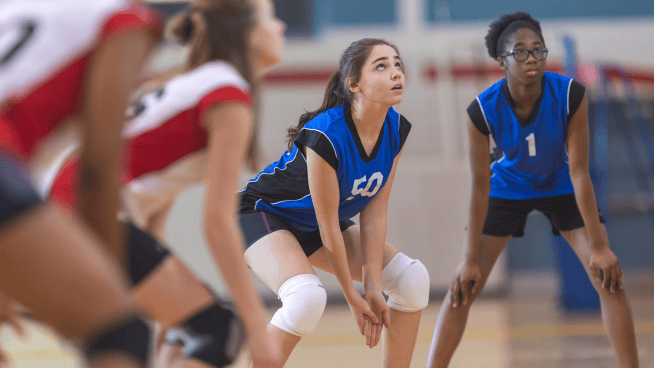What’s in Your Gym Bag? Sport-Specific Post-Workout Food Guidelines
Stretching is not your only important post-workout ritual.
For serious athletes, it’s just as critical to refuel with a post-workout meal. This decision can make all the difference in your next performance. By repairing and rebuilding your body with the right foods, you allow yourself to consistently train at a high level of intensity, ultimately giving yourself an edge over your competition. (See Post-Workout Meal Guidelines.)
Your food selections should be just as sport-specific as your training. There is no question that a long-distance runner’s workout is as intense as a football player’s routine. However, each sport’s training tests specific muscular and energy systems. Similarly, different foods are necessary to help athletes in different sports recover more efficiently.
Endurance Athletes
These are the key post-workout recovery guidelines for endurance athletes, those who participate in sports (e.g., cross-country and soccer) that require a high level of both cardiorespiratory and muscular endurance.
Restore glycogen
During intense activity, your muscles use up all their glycogen stores to keep up with your training. Within 20 minutes after you finish a workout, consume a clean source of carbohydrate to refuel this glycogen to your muscles. Try a piece of fruit or whole-wheat bread. (Get more examples in The Truth About Post-Workout Carbs.)
Soft tissue repair
The repetitive motions and high-impact exercises endurance sports require for conditioning place a lot of stress on cartilage, tendons and ligaments. This makes repairing soft tissue damage a high priority. Some studies have shown that warming herbs like glucosamine or cayenne pepper can boost circulation. This allows necessary nutrients and oxygen to flow through your body and restore soft tissue. Try a teaspoon in a glass of lemon water. [1]
Reduce inflammation
Inflammation occurs when tissues break down during a workout. Alkaline-based foods (e.g., vegetables, nuts and seeds, omega-3s and some herbs and spices) can help reduce inflammation. Start throwing a serving of almonds in your training bag to eat directly after your session ends. [2]
Tip
Carrying shelf-stable healthy snacks in your gym bag will make eating post-workout easier.
Strength Athletes
In addition to the above tips, athletes who rely on strength to compete (e.g., football players, sprinters, lacrosse and hockey players) should adhere to the following guidelines. (Read Design the Perfect Muscle-Building Post-Workout Meal.)
Repairing muscle tissue
After a hard workout, muscles are starved for protein from all the damage strength training does. Give them what they want by consuming sufficient amounts of protein to repair.
Encouraging protein synthesis
Increasing strength depends on a process called protein synthesis. To promote muscle growth, you need to eat a clean protein source no more than 60 minutes after physical activity. (See Consuming Protein to Build Muscle.)
Studies show that eating protein-rich foods encourages protein synthesis for muscle growth. It can be challenging to store some protein-rich foods in your bag, especially if you’re vegetarian. However, a wide variety of foods can address your muscle needs. Experiment with various nuts and protein bars.
Sources
RECOMMENDED FOR YOU
MOST POPULAR
What’s in Your Gym Bag? Sport-Specific Post-Workout Food Guidelines
Stretching is not your only important post-workout ritual.
For serious athletes, it’s just as critical to refuel with a post-workout meal. This decision can make all the difference in your next performance. By repairing and rebuilding your body with the right foods, you allow yourself to consistently train at a high level of intensity, ultimately giving yourself an edge over your competition. (See Post-Workout Meal Guidelines.)
Your food selections should be just as sport-specific as your training. There is no question that a long-distance runner’s workout is as intense as a football player’s routine. However, each sport’s training tests specific muscular and energy systems. Similarly, different foods are necessary to help athletes in different sports recover more efficiently.
Endurance Athletes
These are the key post-workout recovery guidelines for endurance athletes, those who participate in sports (e.g., cross-country and soccer) that require a high level of both cardiorespiratory and muscular endurance.
Restore glycogen
During intense activity, your muscles use up all their glycogen stores to keep up with your training. Within 20 minutes after you finish a workout, consume a clean source of carbohydrate to refuel this glycogen to your muscles. Try a piece of fruit or whole-wheat bread. (Get more examples in The Truth About Post-Workout Carbs.)
Soft tissue repair
The repetitive motions and high-impact exercises endurance sports require for conditioning place a lot of stress on cartilage, tendons and ligaments. This makes repairing soft tissue damage a high priority. Some studies have shown that warming herbs like glucosamine or cayenne pepper can boost circulation. This allows necessary nutrients and oxygen to flow through your body and restore soft tissue. Try a teaspoon in a glass of lemon water. [1]
Reduce inflammation
Inflammation occurs when tissues break down during a workout. Alkaline-based foods (e.g., vegetables, nuts and seeds, omega-3s and some herbs and spices) can help reduce inflammation. Start throwing a serving of almonds in your training bag to eat directly after your session ends. [2]
Tip
Carrying shelf-stable healthy snacks in your gym bag will make eating post-workout easier.
Strength Athletes
In addition to the above tips, athletes who rely on strength to compete (e.g., football players, sprinters, lacrosse and hockey players) should adhere to the following guidelines. (Read Design the Perfect Muscle-Building Post-Workout Meal.)
Repairing muscle tissue
After a hard workout, muscles are starved for protein from all the damage strength training does. Give them what they want by consuming sufficient amounts of protein to repair.
Encouraging protein synthesis
Increasing strength depends on a process called protein synthesis. To promote muscle growth, you need to eat a clean protein source no more than 60 minutes after physical activity. (See Consuming Protein to Build Muscle.)
Studies show that eating protein-rich foods encourages protein synthesis for muscle growth. It can be challenging to store some protein-rich foods in your bag, especially if you’re vegetarian. However, a wide variety of foods can address your muscle needs. Experiment with various nuts and protein bars.
Sources
[1] Burke, E. R. (1997). “Nutrients that accelerate healing.” Strength & Conditioning Journal, 19(5), 19-23. [2] Work, H. D. Essential Recovery for Endurance Athletes.











